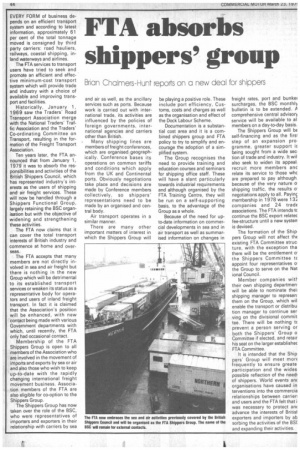FTA absorbs shippers' group
Page 46

If you've noticed an error in this article please click here to report it so we can fix it.
Brian Chalmers-Hunt reports on a new deal for shippers
EVERY FORM of business depends on an efficient transport system and according to latest information, approximately 61 per cent of the total tonnage moved is consigned by third party carriers: road hauliers, railways, coastal shipping, inland waterways and airlines.
The FTA services to transport users have tried to seek and promote an efficient and effective minimum-cost transport system which will provide trade and industry with a choice of available and improving transport and facilities.
Historically, January 1, 1969 saw the Traders' Road Transport Association merge with the National Traders' Traffic Association and the Traders' Co-ordinating Committee on Transport, resulting in the formation of the Freight Transport Association.
Ten years later, the FTA announced that from January 1, 1979 it was to absorb the responsibilities and activities of the British Shippers Council, which has represented industry's interests as the users of shipping and air freight services. These will now be handled through a Shippers Functional Group, largely retaining the BSC organisation but with the objective of widening and strengthening these activities.
The FTA now claims that it can cover the total transport interests of British industry and commence at home and overseas.
The FTA accepts that many members are not directly involved in sea and air freight but there is nothing in the new Group which will be detrimental to its established transport services or weaken its status as a representative body for operators and users of inland freight transport. In fact it is claimed that the Association's position will be enhanced, with new contact being made with various Government departments with which, until recently, the FTA only had occasional contact.
Membership of the FTA Shippers Group is open to all members of the Association who are involved in the movement of imports and exports by sea or air and also those who wish to keep up-to-date with the rapidly changing international freight movement business. Association members of the FTA are also eligible for co-option to the Shippers Group.
The Shippers Group has now taken over the role of the BSC, who were representatives of importers and exporters in their relationship with carriers by sea and air as well, as the ancillary services such as ports. Because work is carried out with international trade, its activities are influenced by the policies of foreign governments, international agencies and carriers other than British.
Many shipping lines are members of freight conferences, which are organised geographically. Conference bases its operations on common tariffs and conditions which apply from the UK and Continental ports. Obviously negotiations take place and decisions are made by Conference members collectively, so shippers' representations need to be made by an organised and central body.
Air transport operates in a similar manner.
There are many other important matters of interest in which the Shippers Group will be playing a positive role. These include port efficiency, Customs, costs and charges as well as the organisation and effect of the Dock Labour Scheme.
Documentation is a substantial cost area and it is a combined shippers group and FTA policy to try to simplify and encourage the adoption of a simplified system.
The Group recognises the need to provide training and education courses and seminars for shipping office staff. These will have a slant particularly towards industrial requirements and although organised by the FTA Training Centre, they will be run on a self-supporting basis, to the advantage of the Group as a whole.
Because of the need for upto-date information on commercial developments in sea and in air transport as well as summarised information on changes in freight rates, port and bunkei surcharges, the BSC monthly bulletin is to be extended.
comprehensive central advisory service will be available to al members on a day-to-day basis.
The Shippers Group will be self-financing and as the firs.
step of an expansion pro gramme, greater support ie being sought from a wide sec tion of trade and industry. It wil also seek to widen its appeal recruit more members anc relate its service to those whc are prepared to pay although because of the very nature o
shipping traffic, the results o.
negotiations apply to all. Payinc membership in 1978 were 13'; companies and 24 trade associations. The FTA intends tc continue the BSC export relatec fee-structure until a new systen is devised.
The formation of the Ship pers Group will not affect the existing FTA Committee struc
lure, with the exception tha there will be the entitlement o.
the Shippers Committee tc appoint four representatives o. the Group to serve on the Nat ional Council.
Member companies witf their own shipping departmen will be able to nominate thei shipping manager to represen them on the Group, which wil enable the transport or distribu tion manager to continue ser ving on the divisional commit tee. There will be nothing tc prevent a person serving or both the Shippers' Group o Committee if elected, and retair his seat on the larger establishec FTA Committee.
It is intended that the Ship pers' Group will meet more frequently to ensure greate participation and the wides possible reflection of the need: of shippers. World events an organisations have caused in terventions into the commercia relationships between carrier: and users and the FTA felt that i was necessary to protect anc advance the interests of Britisl exporters and importers by ab sorbing the activities of the BS( and expanding their activities.
















































































































